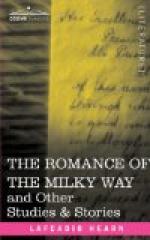[Footnote 43: There is more weirdness in this poem than the above rendering suggests. The word ukaman in the fourth line can be rendered as “shall perhaps float,” or as “shall perhaps be saved” (in the Buddhist sense of salvation),—as there are two verbs ukami. According to an old superstition, the spirits of the drowned must continue to dwell in the waters until such time as they can lure the living to destruction. When the ghost of any drowned person succeeds in drowning somebody, it may be able to obtain rebirth, and to leave the sea forever. The exclamation of the ghost in this poem really means, “Now perhaps I shall be able to drown somebody.” (A very similar superstition is said to exist on the Breton coast.) A common Japanese saying about a child or any person who follows another too closely and persistently is: Kawa de shinda-y[=u]r[’e][:i] no yona tsur[’e]-hoshigaru!—“Wants to follow you everywhere like the ghost of a drowned person.”]
Ukaman to
Fun[’e] we shita[:e]ru
Yur[’e][:i] wa,
Shidzumishi h[’i]to no
Omo[:i] naruran.
[The ghosts following after
our ship in their efforts to rise
again (or, “to be saved”)
might perhaps be the (last vengeful)
thoughts of drowned men.[44]]
[Footnote 44: Here I cannot attempt to render the various plays upon words; but the term “omo[:i]” needs explanation. It means “thought” or “thoughts;” but in colloquial phraseology it is often used as a euphemism for a dying person’s last desire of vengeance. In various dramas it has been used in the signification of “avenging ghost.” Thus the exclamation, “His thought has come back!”—in reference to a dead man—really means: “His angry ghost appears!”]
Uram[’e]shiki
Sugata wa sugoki
Yur[’e][:i] no,
Kaji we jama suru
Fun[’e] no Tomomori.
[With vengeful aspect,
the grisly ghost of Tomomori
(rises) at the stern of the
ship to hinder the play of her
rudder.[45]]
[Footnote 45: There is a double meaning given by the use of the name Tomomori in the last line. Tomo means “the stern” of a ship; mori means “to leak.” So the poem suggests that the ghost of Tomomori not only interferes with the ship’s rudder, but causes her to leak.]
Ochi-irit[’e],
Uwo no [’e]jiki to
Nari ni ken;—
Funa-y[=u]r[’e][:i] mo
Nama-kusaki kaz[’e].
[Having perished in the sea, (those H[’e][:i]k[’e]) would probably have become food for fishes. (Anyhow, whenever) the ship-following ghosts (appear), the wind has a smell of raw fish![46]]
[Footnote 46: Namakusaki-kaze really means a wind having a “raw stench;” but the smell of bait is suggested by the second line of the poem. A literal rendering is not possible in this case; the art of the composition being altogether suggestive.]




